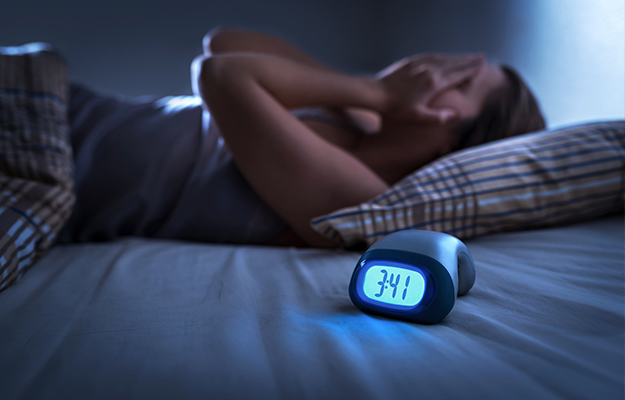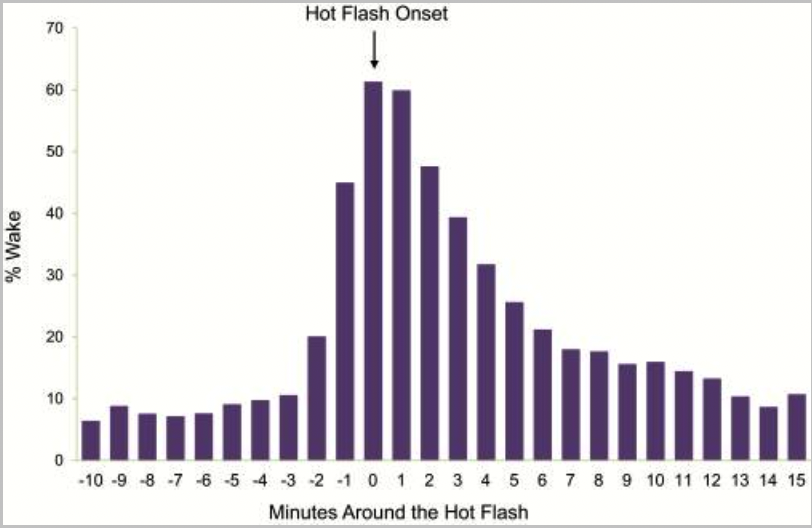So it’s happening again: countless nights of restlessness that drive you insane.
Sleep – when you’re supposed to get some rest after a long, hard day – is now more of a challenge than before. Poor sleep quality affects you physically and psychologically, as the fear of insomnia surges when the night comes.
The truth is, you’re not alone in the fight for sleep. According to The Sleep Foundation, menopause sleep problems are pervasive, affecting 35% to 60% of postmenopausal women and 39% to 47% of perimenopausal women.
What is the connection between menopause and sleep? How do they co-occur and cause you to feel exhausted when you’re supposed to feel refreshed?
Menopause and Sleep: The Silent Culprit Behind Your Insomnia
Menopause Triggers Hot Flashes
If you’re going through menopause, you know hot flashes. They are the perpetual occurrences of warm sensations coming from your neck and chest and spreading over your face. Hot flashes usually come with night sweats, as the latter is your body’s natural reaction to cool down the heat due to hot flashes.
Hot flashes are due to low estrogen levels. A significant drop in this female hormone is also the cause of many other sleep-related issues during menopause.
So estrogen is more far-reaching than you think. It’s involved in various bodily processes apart from regulating the reproductive system. Specifically, the female hormone plays a role in regulating body heat. When estrogen drops, the female body loses its ability to sense the temperature, causing it to dysregulate the cells that produce heat.
As a result, the cells in your body generate more heat than they should, increasing your temperature. Of course, sleep is more challenging if you keep thinking about taking off your pajamas and lowering the room temperature. And it won’t be a surprise when you wake up drenched the following day due to night sweats.
Menopause Causes Sleep Latency
Sleep latency is the time it takes until you fall asleep. On average, a healthy woman needs between 10 and 20 minutes to transition from full wakefulness to sleep. Although people need a different amount of time to hit the sack, menopausal women desperately require much longer. And this prolonged sleep latency is detrimental.
Estrogen is the essential hormone that affects serotonin, a neurotransmitter in sleep inducement. More estrogen means higher levels of serotonin and a more significant number of its receptors in the brain. Estrogen also affects melatonin, a hormone that controls the sleep-wake cycle, as serotonin is a chemical precursor to melatonin.
Due to these reasons, menopausal women tend to struggle to fall asleep. Imagine going to bed at 10 PM but only being able to get some shut-eye after midnight. Your eyes keep moving around frantically under your eyelids (the phenomenon is called REM or Rapid Eye Movement sleep), and the fear of another sleepless night gets on your nerves.
Menopause Promotes Awakenings

Midnight awakenings (also known as nocturnal wakefulness) are very common among menopausal women. So you are awakened in the middle of the night at around 3 AM for no apparent reason. Also, this knock-up on your sleep happens out of the blue and can repeat almost every hour until early morning.
Research has shown that awakenings during menopause are primarily due to hot flashes. Specifically, up to 78% of the hot flashes co-occur with wake episodes, while 66% occur within 5 min before or after. The study also discovered a 5-fold increase in the likelihood of waking up in the few minutes right before and after a hot flash.

Wake-sleep status around the onset of hot flashes. Source: Sleep Research Society.
The figure above shows that awakenings don’t always happen simultaneously at the onset of a hot flash. Instead, there is a slight chance (around 10%) of waking up 10 minutes before you feel it coming. This chance is even higher after the hot flash is gone, as nearly 15% of awakenings happen 15 minutes after a heating episode.
Menopause Shortens Sleep Time
According to a recent government report, women in their midlife aren’t sleeping enough. Insomnia symptoms are reported by up to 61% of postmenopausal women, and many more admit to sleeping fewer than 6 hours per night. So, it’s upsetting to compare the ideal 7 to 9 hours of high-quality sleep in theory with the reality of many women.
The combined hot flashes, increased sleep latency, and frequent awakenings are the coexisting causes of shortened sleep time. Your sleep-wake cycle also alters and becomes less regular. You start to get tired earlier and wake up earlier in the morning. These changes are why menopausal women are more likely to experience insomnia (up to 60%).
Menopause Induces Sleep Apnea
If you think menopause has caused enough trouble for your sleep, unfortunately, there’s more than that. Menopause and a drop in estrogen levels are associated with increased sleep apnea events. This sleep-related disorder causes your breathing to repeatedly stop and start, resulting in loud snoring, headaches, and exhaustion after waking up.
Although sleep apnea is often thought to be a men’s condition, it’s prevalent in women during menopause (1 in every 10 women and 4 men). Moreover, research shows that while 22% of younger women have sleep apnea, this number in women aged 55 is alarming at 48%. No wonder why your spouse keeps telling you that you snore a lot.
Scientists claim that an increase in body weight and the incidence of obesity among menopausal women are the reasons. When your body, especially the area around the neck, develops excessive fat, the passage connecting your throat and lungs can be obstructed, leading to temporary but unconscious gasping for air during sleep.
Bottom Line: Hormone Therapy for Sleep
Estrogen acts everywhere in your body.
Even if reproductivity is no longer your concern at your age, sleep is still vital in every stage of life. So don’t let menopause be the silent culprit behind your persistent restlessness.
Hormone replacement therapy (HRT, also known as menopausal hormone therapy) is a safe and efficient treatment that aims to normalize the levels of hormones in the female body. Because low estrogen is the primary cause of sleep disorders, hormone therapy can reportedly improve overall sleep quality among menopausal women.
According to a study, transdermal estrogen improves sleep quality by lowering the frequency of awakenings. It also reduces vasomotor symptoms, such as hot flashes and night sweats. In addition, estrogen may also benefit sleep latency, distribution of sleep stages, sleep efficiency, and total sleep time.
So, if you’re having problems with menopause and sleep, adjusting your body from within and giving it better hormones through hormone therapy is the right way to call it a night again. Until then, menopause and insomnia will no longer be your sleep robber.
Yunique Medical provides FUNCTIONAL MEDICINE for optimized health and performance. We offer customized, scientifically advanced treatments, including menopause treatments in Ocala, Port Orange, and The Villages, to create a new state of human thriving. Why be ordinary when you can be optimal?
HUMAN 2.0 begins here!
Contact us to schedule your FREE consultation at one of our three locations in Florida – Ocala, Fruitland Park (The Villages), and Daytona.
UP NEXT:


